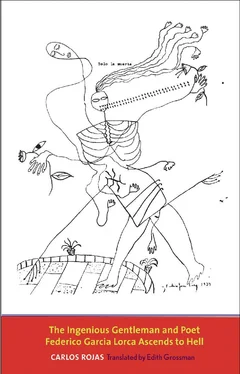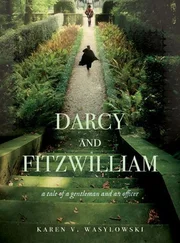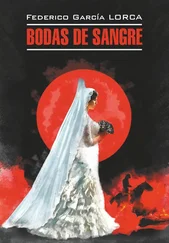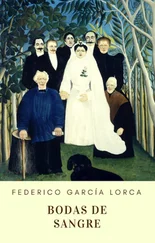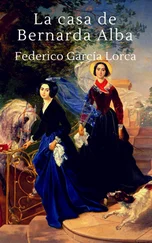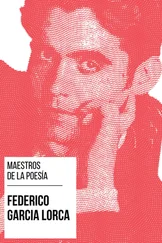Carlos Rojas
The Ingenious Gentleman and Poet Federico García Lorca Ascends to Hell
For Marina and Sandro Vasari, with the gratitude of C.R.
The road to this translation of Carlos Rojas’s The Ingenious Gentleman and Poet Federico García Lorca Ascends to Hell was a circuitous one. I first read the novel about thirty years ago, not long after its 1980 publication in Spanish. I was a fairly new translator then, and I kept thinking how wonderful it would be to translate the book and bring it to the attention of an English-speaking readership. As it turned out, I had to wait three decades for that hope to become a reality, but it did, finally, thanks to the Margellos World Republic of Letters and Yale University Press. During all that time I never forgot this extraordinary novel: its breathtaking originality, devastating evocation of historical figures, and sharp-eyed re-creation of the period preceding the Spanish Civil War. The constant explosive violence led to the murder in 1936, soon after the right-wing military coup that started the war, of Federico García Lorca, one of Spain’s leading poets and playwrights. He became Spain’s best-known martyr, a victim of history run amok.
Rojas has many talents, but one of his great gifts as a novelist is his seamless blending of a meticulously researched historical background (all the characters, with the exception of Sandro and Marina Vasari, are based on actual people) with a highly inventive view of the possibilities of fiction. The novel is filled with figures who walk off the stage of history and into the pages of the book: Antonio Machado, the exceptional poet of the generation just before Lorca’s; Rafael Alberti, Lorca’s contemporary and fellow member of the Generation of 1927; Salvador Dalí, the great surrealist painter; José Antonio Primo de Rivera, founder of the Falange, the Spanish imitation of Mussolini’s Fascist Party. I’ve cited only a very few of the literary, artistic, and political personalities who populate this variation on the life of García Lorca and the catastrophe of Spain.
Rojas’s debt to Cervantes, the forebear of European fiction, is deep, and it is clearly acknowledged: “ingenious gentleman” is the phrase Cervantes used to describe his protagonist in the title of his genre-defining work. It was in Part Two of Don Quixote , published in 1615, ten years after Part One, and just a year after the appearance of an anonymous, bogus continuation of the knight’s adventures — what has come to be known as the “false Quixote ”—that Cervantes took a kind of metaphysical leap through the novelistic looking glass he himself had created and gave obviously fictional characters (Quixote and Sancho) the presence and dimensionality of those other personages who seem to be real and are intended to help create verisimilitude, the appearance of truth that was, for Cervantes, the goal of fiction. Since the landscape of Don Quixote evokes a contemporary reality and a good number of historically factual people and events, it doesn’t require much for the reader to suspend dis-belief and accept the actuality of the nobles, peasants, innkeepers, servants, friars, travelers, soldiers, ladies, and outlaws the knight and his squire encounter on their travels. In one of the uncommon inns that stud this seventeenth-century countryside, two gentlemen are reading and discussing the sham continuation, but the “real” Quixote and Sancho, who know, remarkably, of the existence of Part One, which recounts their adventures, overhear their conversation and disabuse them of the false Quixote ’s authenticity. The profound ambiguity created here is the legitimate forerunner not only of Rojas’s novelistic creation but of most, if not all, of the experimental fiction in our own time.
In The Ingenious Gentleman we encounter a unique vision of hell and eternity; heaven doesn’t enter into the equation, unless it’s the reward of total unconsciousness and loss of self-awareness that may be the outcome of each damned soul’s impending trial. In the theaters of the damned lining a corridor that ascends the spiral, we discover two alternative endings to García Lorca’s life. These variations are physically embodied as aged versions of the younger poet (Lorca was thirty-eight when he was killed), who materialize in his theater and assert their reality. In the second decade of the twentieth century, Luigi Pirandello ( Six Characters in Search of an Author ) and Miguel de Unamuno ( Mist ) walked this path as well, giving imagined characters the status of those who imagine them, but I think Rojas’s foray into hyperspeculation is more extensive and closer to the Cervantean imagination. He novelizes himself and slowly becomes a significant presence in the action. The creation of a fictionalized version of the real author also has its roots in Don Quixote , where Cervantes’s prologue to Part One involves an imagined version of himself and a friend who helps him write the dreaded, obligatory introduction to the novel. Rojas’s alter ego (C.R. in The Ingenious Gentleman ) isn’t more solid than the characters in the novel and, in fact, almost begins to blur as Marina and Sandro Vasari come to the realization that they are his creation.
In a recent e-mail, Carlos Rojas described his book in a characteristically enigmatic manner. His remarks foreshadow the fiction you are about to read and are a kind of preview of his sharp, direct style and stunning imagination:
In death’s eternal curvature of space time there is no absolute certainty. In the small hours of either August 18th or August 19th, 1936, a fascist firing squad shot Federico García Lorca between the villages of Viznar and Alfacar, some six miles northwest of Granada.…
Needless to add, the proven mortal remains of any of the three Lorcas have never been disinterred in the historical present. Moreover, toward the end of the book, two new characters vainly try to decline its authorship with fictitious arguments. Meanwhile, an unusual hoarfrost and menacing hailstorm assail Atlanta, Georgia, of all places. François Villon, another poet who lived five centuries before Lorca and also vanished from earth without a trace, would have said that poetry, or for that matter narratives, are but lost snows that once covered a vanished past.
You are about to discover a wonderful writer who will take you to places you’ve never imagined in ways you never dreamed possible. Enjoy the trip.
EDITH GROSSMAN
New York
THE INGENIOUS GENTLEMAN AND POET FEDERICO GARCÍA LORCA ASCENDS TO HELL
I thought the dead were blind, like the ghost of that Gypsy girl in one of my poems, who peered into the cistern in the garden and didn’t see things when they were looking at her.
I was wrong. For the dead everything is unanimous presence at a perpetually unreachable distance. All you lived, all you thought, any chimera fantasized on earth becomes at once possible and inaccessible in hell. It’s enough to evoke an event or a dream for it to be immediately represented, with perfect precision, in this almost darkened theater where I suffer alone, perhaps for eternity.
Imagine a solitude that is perhaps interminable in a large orchestra section I share with no one. Through two transoms on the tapestry-covered walls comes a very cold light, between amber and alabaster. It barely outlines the backs of the empty seats, covered in turn in ash-colored velvet. With time and in this almost total gloom, I grew accustomed to making out the stage with its long arch and deep proscenium. There the front curtain and backdrop are always raised or perhaps do not exist. On the boards — real boards — the absent becomes present when my desire conjures up mirages of memories, readings, or reveries. If I were to tell you everything I have seen again, and you could hear me, you’d believe that we who are dead are mad.
Читать дальше
